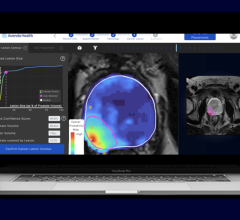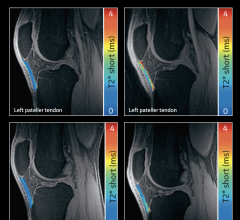
Assessment of stenosis in a coronary artery using dual-source CT.
July 23, 2009 – Dual-energy CT used as a single examination might be promising for the integrative analysis of the coronary artery morphology and the myocardial blood supply and is in good agreement with angiography and SPECT, according to a study published in this month’s issue of The American Journal of Cardiology (volume 104, issue 3, pages 318-326, August 2009).
To evaluate the performance of dual-energy computed tomography (DECT) for integrative imaging of the coronary artery morphology and the myocardial blood supply, 36 patients (15 women, mean age 57 ± 11 years) with equivocal or incongruous single photon emission CT (SPECT) results were investigated by a single-contrast medium-enhanced, retrospectively electrocardiographic-gated, DECT scan with simultaneous acquisition of high and low X-ray spectra. Thirteen patients subsequently underwent invasive coronary angiography. The DECT data were used to reconstruct anatomic coronary CT angiographic images and to map the myocardial iodine distribution within the left ventricular myocardium.
Two independent observers analyzed all DECT studies for stenosis and myocardial iodine defects. A segmental comparison was performed between the stress/rest SPECT perfusion defects and DECT iodine defects and between the angiography and coronary CT angiographic findings for stenosis. The sensitivity, specificity, positive predictive value, negative predictive value, and accuracy were estimated.
Overall, researchers said DECT had 92 percent sensitivity and 93 percent specificity, with 93 percent accuracy for detecting any type of myocardial perfusion defect seen on SPECT. Contrast defects at DECT correctly identified 85 (96 percent) of 89 fixed and 60 (88 percent) of 68 reversible myocardial perfusion defects. Compared with angiography, coronary CT angiography had 90 percent sensitivity, 94 percent specificity, and 93 percent accuracy for the detection of more than 50 percent stenosis.
The study was conducted by the Department of Radiology and Radiological Science, Medical University of South Carolina, Charleston; the Division of Cardiology, Department of Medicine, Medical University of South Carolina, Charleston; the Department of Diagnostic Radiology, Tan Tock Seng Hospital, Singapore; and the Department of Radiology, University of Navarra, Pamplona, Spain.
For more information: www.ajconline.org


 November 13, 2025
November 13, 2025 









